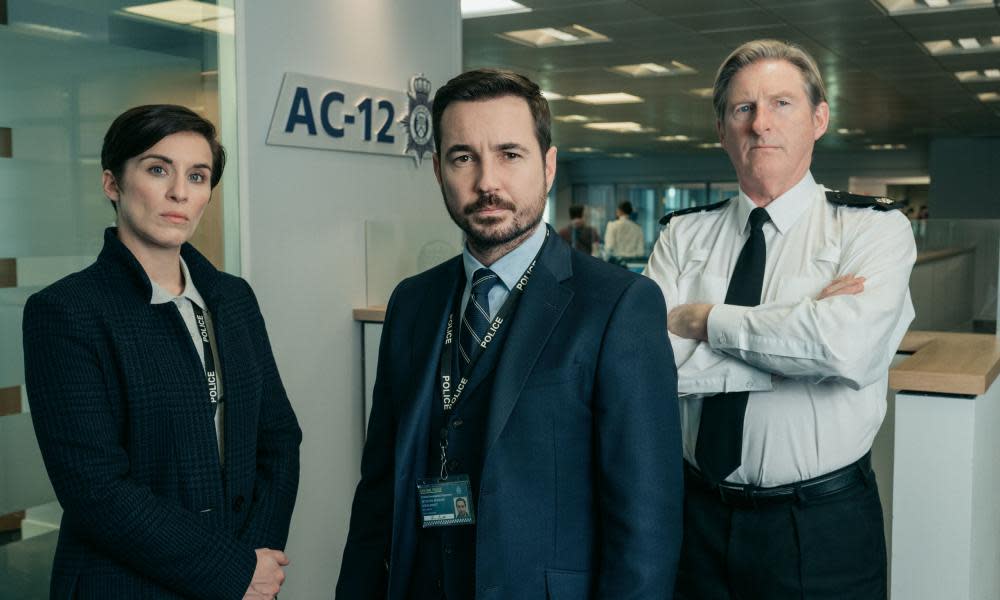Met chief 'outraged' at Line of Duty over corruption portrayal

It has been one of Britain’s most watched television series of the year, drawing audiences with tension-ratcheting story lines, razor sharp plot twists and grand conspiracies set among police ranks.
Yet for all of its awards and popularity, Line of Duty has failed to find a fan in Britain’s most senior police officer, who said she was distinctly unimpressed with its portrayal of corruption.
“I was absolutely outraged by the level of casual and extreme corruption that was being portrayed as the way the police is in 2018–19. It’s so far from that,” said Cressida Dick, the commissioner of the Metropolitan police.
“The standards and the professionalism are so high.”
Dick, who said she accepted that the programme was “good drama”, made the comments in an interview with the Radio Times promoting the third series of the BBC One documentary The Met: Policing London.
The Met commissioner revealed herself to have been oblivious to the Line of Duty phenomenon but was prompted to catch up on the series after she found herself sitting next to one of the lead actors, Vicky McClure.
Dick added that she was more outraged by The Bodyguard, also written by Line of Duty creator, Jed Mercurio.
Related: Line of Duty season finale is UK's most watched TV show of 2019
“It drove everybody round here absolutely up the wall!” she told the Radio Times.
“I actually did have to switch it off after about 20 minutes – the moment when the home secretary made a pass at the protection officer was just beyond me, I’m afraid.”
Dick did concede that both shows could ultimately do the police good. “Both series actually make us look a bit cool and interesting – a net positive, probably,” she said. “They bring in interest and applications. Even though it’s all completely ludicrous.”
There was support for Dick’s criticisms from Helen King, formerly assistant commissioner at the Met. “Casual corruption and casual disregard of police procedures and the law is not a part of modern day UK policing, let alone part of police corruption investigations,” she said.
King, who is now Principal of St Anne’s College, Oxford, added: “Of course, dramas have to take liberties to keep viewers hooked, but it does worry me a bit that viewers may unconsciously assume that this is the reality.
“It wasn’t just the widespread corruption that the series showed but also a pattern of apparently non-specialist officers self arming and running around with guns and senior officers not coordinating and controlling investigations as they should.”
Mercurio himself has a history of responding robustly to critics who claim his shows are unrealistic. Defending Line of Duty to the Observer in 2016, he said: “It’s a television drama about a fictional police department. Every series deals with a different story that throws up legal, ethical and moral issues.”
“Just because someone was a police officer doesn’t mean that they have supreme authority to say whether something is accurate or plausible. Other police officers might disagree,” he added.
Speaking on his career as a doctor before becoming a scriptwriter and how medical dramas were frustrating to watch at the time, he said: “I do believe that there is an emotional quality to the responses of some of the people who watch and who are affronted as I was, because nothing can really match the intensity of the experiences that are personal to them.”
Regardless of Dick’s criticisms, Mercurio’s work has appeared to find a ready audience among police officers, past and present.
Peter Bleksley, who was a founder member of Scotland Yard’s undercover unit in the 1980s and was presenter of Channel 4 programme Hunted, said in response to Dick’s remarks: “It’s the entertainment industry and if anyone can’t see that it’s a little concerning.
“Millions of people watch it and enjoy it on a regular basis. It’s drama. Simple as that. And with drama you have to suspend your disbelief and sit back to enjoy with a glass of red and the family.”
David Zinzan, a former detective superintendent in the Met’s anti-corruption unit who has advised on the script for Line of Duty, has previously spoken of former colleagues complaining to him.
“Some officers say to me: ‘Why is it so negative’?’ I’d have a different spin on that. I’d say it shows that there is a dedicated force who are there to root corruption out,” he told the Guardian.
“It is a drama series, not a documentary. But that’s the advantage of drama: if it was entirely accurate it would be far more plodding and less dramatic.”

 Yahoo News
Yahoo News 
